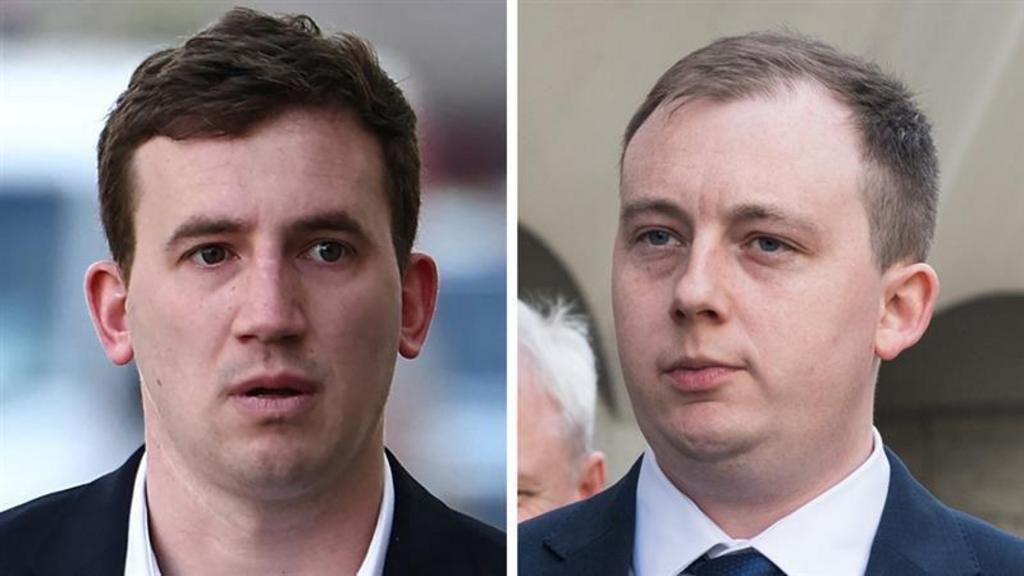A government minister has asserted that Jonathan Powell, the national security adviser, did not make any decisions regarding the evidentiary content in the collapsed case against two men accused of espionage on behalf of China.
In September, prosecutors unexpectedly dropped charges against Christopher Cash and Christopher Berry, who have consistently denied the allegations.
Kemi Badenoch, a prominent Conservative figure, alleged that the case faltered due to the government’s refusal to provide the Crown Prosecution Service (CPS) with “vital information,” attributing this to a desire to “curry favour” with China.
Security Minister Jarvis refuted claims that the government deliberately undermined the case, dismissing them as “baseless.”
Mr. Powell, a senior advisor and political ally of the prime minister, is facing scrutiny over his potential role in the trial’s collapse, with Conservatives stating that he has “questions to answer.”
Sir Keir Starmer has expressed his “full confidence” in his national security adviser, stating to broadcasters that “He is doing an excellent job.”
Christopher Cash, a former parliamentary researcher, and Christopher Berry were charged under the Official Secrets Act in April 2024, during the Conservative government’s tenure.
They were accused of gathering and providing information prejudicial to national security interests between December 2021 and February 2023.
However, last week, the head of the CPS stated that the case collapsed because the government could not provide evidence referring to China as a national security threat.
Director of Public Prosecutions Stephen Parkinson explained that while sufficient evidence existed when charges were initially filed in April 2024, a precedent set by a prior espionage case necessitated that China be explicitly labelled a “threat to national security” at the time of the alleged offenses.
In a statement to MPs in the Commons, Minister Jarvis denied reports that Mr. Powell had decreed China could not be defined as a national security threat during a meeting of Whitehall officials in September, shortly before the charges were dropped.
“Of course, [the national security adviser] takes part in discussions about national security and diplomatic relations. That is literally his job,” he said.
“But any discussions were on the basis that the case would be going ahead and how to handle the implications.
“The national security adviser was not involved in any decisions about the substance of the evidence.”
Jarvis stated that Deputy National Security Adviser Matthew Collins provided a witness statement in December 2023 under the previous Conservative government, with further statements requested and provided in February and July of this year.
He affirmed that Mr. Collins was granted “full freedom to provide evidence without interference,” adding, “Ministers and special advisers did not take decisions about that evidence and they were not cited on the contents.”
Jarvis clarified that all evidence provided was based on the law and the Tory government’s position on China at the time of the alleged offenses.
He further stated that the decision to proceed with the prosecution was made by the CPS, “who were hamstrung by antiquated legislation.”
The Official Secrets Act of 1911 has since been superseded by the 2023 National Security Act, which Jarvis said closed “the loopholes that have been exposed by this particular case.”
“Suggestions that the government concealed evidence, withdrew witnesses, or restricted the ability of witnesses to draw on particular bits of evidence are all untrue,” he said.
“The [deputy national security adviser] did not materially change his evidence and was under no pressure from anyone to do so…
“What has changed is the CPS’s assessment of the case law.”
Jarvis placed blame on the preceding Tory government for failing to classify China as a national security threat and for being too “slow” in updating national security laws.
Defending her party’s record, Badenoch cited instances where Tory ministers and government documents had described China as a “threat.”
“The trial has collapsed because for months and months, the government has been refusing to give the CPS vital information,” she stated.
“This wasn’t a mistake. This wasn’t a misunderstanding. This looks like a deliberate decision to collapse the case and curry favour with the regime in China.”
She added: “I suspect that [ministers] have decided that closer economic ties with China were more important than due process and our national security.”
The Liberal Democrats have called on the government to “come clean on why this case fell apart” and to publish all correspondence between the deputy national security adviser and the CPS.
The party’s foreign affairs spokesperson, Calum Miller, stated: “The government’s attempts to duck scrutiny and scapegoat a single official simply won’t wash.
“It’s inconceivable that neither Keir Starmer nor his national security adviser knew what evidence was being submitted in such an important case.
“The buck for this fiasco ultimately stops with the prime minister.”
Meanwhile, Jarvis confirmed that MI5’s National Protective Security Authority had published new advice for politicians on how to protect themselves from espionage and foreign interference.
The guidance warns MPs they are a potential target for foreign spies, with China, Russia and Iran identified as particular risks to British institutions.
Sign up for our Politics Essential newsletter to keep up with the inner workings of Westminster and beyond.
In a letter to Starmer, the Tory leader claimed his government’s account of the collapsed case had “changed repeatedly”.
Beijing says it could introduce “countermeasures” if the US President imposes an an additional 100% tariff on Chinese imports.
The move, which is aimed to protect supplies of technology, could raise tensions between the EU and China.
Zion Church, founded by pastor Jin Mingri in 2007, is one of China’s largest underground church networks.
High-ranking officials from China and Russia are in Pyongyang to attend the anniversary celebrations.

